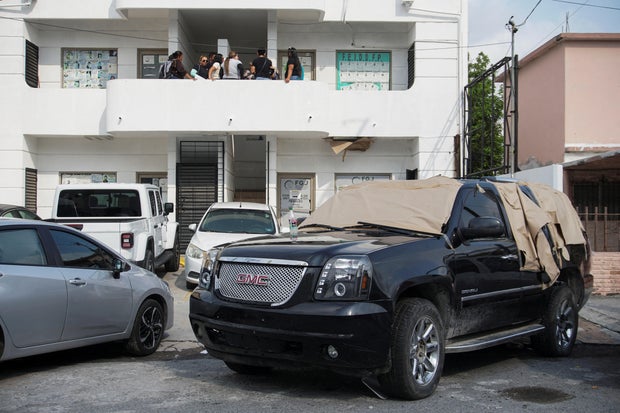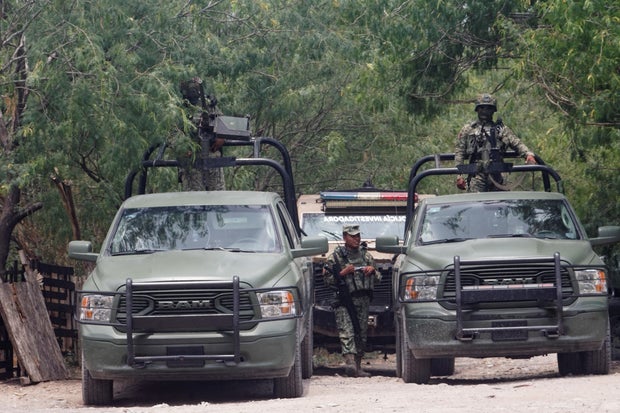
5 missing musicians found dead near U.S. border in Mexico; alleged cartel members arrested
30. May 2025
The bodies of five musicians, members of a Mexican regional music group who had gone missing, were found in the northern city of Reynosa along the Texas border, authorities said on Thursday.
The musicians from the band Grupo Fugitivo, which played at parties and local dances in the region, had been reported missing since Sunday.
Tamaulipas state prosecutors, who had been investigating their disappearance, said the men were kidnapped around 10 p.m. that night while traveling in a SUV on the way to a venue where they were hired to play. Their bodies were found on the fringes of Reynosa. Prosecutors said nine suspects believed to be part of a faction of the Gulf Cartel, which has strong presence in the city, have been arrested.
Authorities were not immediately able to say why the men were slain, and did not deny reports by local media that the bodies had been burned.
Stringer / REUTERS
Relatives had reported receiving ransom demands for the musicians, aged between 20 and 40 years old. The band was hired to put on a concert but arrived to find a vacant lot, according to family members.
The genre they played – Mexican regional music, which encapsulates a wide range of styles including corridos and cumbia – has in recent years gained a spotlight as it’s entered a sort of international musical renaissance. Young artists sometimes pay homage to leaders of drug cartels, often portrayed as Robin Hood-type figures.
It was not immediately clear if the group played such songs or if the artists were simply victims of rampant cartel violence that has eclipsed the city. But other artists have faced death threats by cartels, while others have had their visas stripped by the United States under accusations by the Trump administration that they were glorifying criminal violence.
The last time the musicians from the band Grupo Fugitivo were heard from was the night they were kidnapped, when they told family members they were on the way to the event. After that, nothing else was heard of them.
Their disappearance caused an uproar in Tamaulipas, a state long eclipsed by cartel warfare. Their families reported the disappearances, called on the public for support and people took to the streets in protest.
On Wednesday, protesters blocked the international bridge connecting Reynosa and Pharr, Texas, later going to a local cathedral to pray and make offerings to the disappeared.
Stringer / REUTERS
Reynosa is a Mexican border city adjacent to the United States and has been plagued by escalating violence since 2017 due to internal disputes among groups vying for control of drug trafficking, human smuggling and fuel theft.
Musicians sometimes get caught in cartel turf wars
Mexican musicians have previously been targeted by criminal groups that pay them to compose and perform songs that glorify the exploits of their leaders.
Such performers often live in close proximity to their drug lord patrons, and can at times get caught up in gang turf battles.
“Narcocorridos” are a controversial sub-genre of music in Mexico, and the songs have caught the attention of President Claudia Sheinbaum, who recently launched a music contest “for peace and against addictions,” seeking to counter the popularity of the music among young people in Mexico and the United States.
Several regions in the country have banned “narcocorridos,” sparking a recent riot during a concert after a singer refused to perform some of his most popular songs.
In April, the U.S. State Department revoked the visas of members of a Mexican band after they projected the face of a drug cartel boss onto a large screen during a performance in the western state of Jalisco. U.S. Deputy Secretary of State Christopher Landau, who was U.S. ambassador to Mexico during the first Trump administration, said on social media that the work and tourism visas of members of Los Alegres del Barranco were revoked.
The controversy broke out in late March when the face of Nemesio Rubén “El Mencho” Oseguera Cervantes layered over flames was projected behind the band, originally hailing from Sinaloa, during the concert.
Oseguera is the leader of the Jalisco New Generation Cartel, which has been connected to a ranch authorities say was used to train cartel recruits and possibly dispose of bodies in Jalisco, where searchers found human bone fragments, heaps of clothing and shoes. The U.S. government has offered a $15 million reward for information leading to Oseguera’s capture. In November, his son-in-law was arrested in California after U.S. officials say he faked his own death to “live a life of luxury” north of the border.
The Jalisco cartel is among other criminal groups in Mexico that have been designated as foreign terrorist organizations by the Trump administration.
While the image was met by applause during the concert, Jalisco prosecutors quickly announced they were summoning the band to testify in an investigation into whether they were promoting violence, a crime which could result in a penalty of up to six months in prison
In 2018, armed men kidnapped two members of the musical group “Los Norteños de Río Bravo,” whose bodies were later found on the federal highway connecting Reynosa to Río Bravo, Tamaulipas.
In 2013, 17 musicians from the group Kombo Kolombia were executed by alleged cartel members in the northeastern state of Nuevo Leon, allegedly because of links to a rival gang.
Agence France-Presse contributed to this report.

